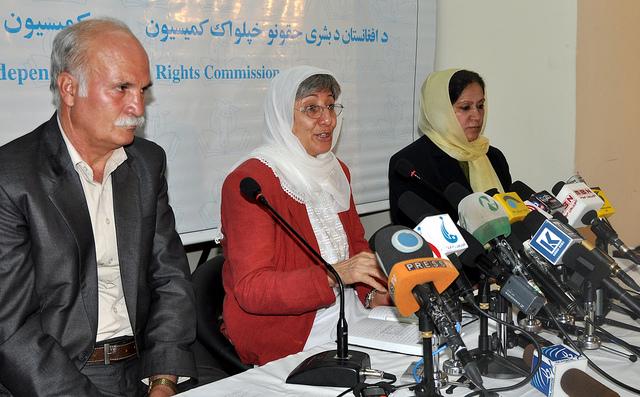KABUL Independent Human Rights Commission (AIHRC) on Sunday asked the government to release the findings of investigations into honour killings and rape cases and amend the criminal law.
The AIHRC released its report that said 406 cases of honour killings and sexual assaults were registered by its regional and provincial offices over the past one year. The cases include 243 incidents of honour killings and 163 incidents of sexual assaults against women.
The report said a large number of such cases went unreported due to severely sensitive traditions and cultural restrictions. Of the total cases, 127 have been documented, including 66 percent (84 cases) of sexual assaults and 34 percent (43 cases) of honour killings.
A commissioner of the AIHRC, Suraya Sobh Rang, said most cases of honour killings were linked to out-of-wedlock sex. “The findings of this inquiry show almost 50 percent of honour killings were committed as a result of illicit relations between a woman and a man.”
“Sometimes victims of sexual assault are subjected to honour killings. This constitutes 3.8 percent of honour killings documented in the report,” she added Women, despite being victims of sexual attacks, were killed on the pretext that they have brought shame to their families and tribes.
“Therefore, the killing of women is considered as redressing and removing the shame and humiliation. Researches show that in many cases, justice and judicial organs in Afghanistan also consider victims of sexual assaults as criminals and condemn them. This is common in most of Afghanistan provinces,” the report said.
Runaway from home is not crime under Afghanistan laws, but it has led to killing of women.
Sobh Rang cited from the report that nearly 15.4 percent of honour killings documented under the national inquiry programme were a result of escaping home. Similarly, 3.8 percent cases were linked to forced marriages and 1.9 percent to denying marriages, she added.
She said social restrictions and customs remained strict and harsh for women, but men were not treated the same way for being a superior creature in the society.
The report said its findings showed a high level of vulnerability and severe restrictions against women in traditional societies of Afghanistan.
“The shocking point is that almost 35 percent of the cases have been committed by those having a relationship with the victims. For example 17 percent of sexual assault cases have been committed by relatives, around 10 percent by neighbours, four percent by fathers, two percent by brothers and one percent by uncles of the victims. One percent of the cases have been committed by suitors,” the report says.
The research shows a very high level ratio of committing sexual assaults and honour killings among young individuals and middle age people. Such cases constitute 82 percent. Based on the research, 46.4 percent of sexual assaults and 34.9 percent of honour killing were committed by persons aged between 19 and 30 years.
Under Article 398 of the Criminal Law, a person who sees his spouse or other close relatives committing adultery or lying in the same bed with another person, if immediately kills or injures one or both to defend his honour, shall be exempted from punishment for laceration and murder but shall be imprisoned for a period not exceeding two years, as a “tazeeri” punishment.”
Meanwhile, Seema Samar, the AIHRC head, told the report launching ceremony that the criminal law should be revised.
About the report, she said statistics in the report did not represent the whole of the country, but only those cases which had been reported. Many incidents of honour killings and rape could not report and kept secret by families, she said.
She asked the government to bring culprits of violence against women, honour killers and rapists to justice and establish forensic departments in all provinces.
Reforms should be introduced into judicial departments, jirgas and shuras should be prevented from deciding on cases concerning women, she demanded.
She also asked the government to prevent child and forced marriages and appealed to religious scholars and media outlets to work together for creating awareness about women’s rights.
myn/ma
Visits: 0









GET IN TOUCH
NEWSLETTER
SUGGEST A STORY
PAJHWOK MOBILE APP